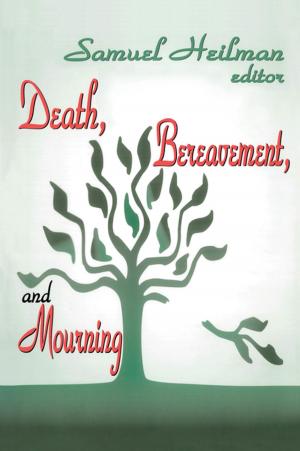Visionary Dreariness
Readings in Romanticism's Quotidian Sublime
Fiction & Literature, Literary Theory & Criticism, Poetry History & Criticism| Author: | Markus Poetzsch | ISBN: | 9781135523794 |
| Publisher: | Taylor and Francis | Publication: | September 13, 2013 |
| Imprint: | Routledge | Language: | English |
| Author: | Markus Poetzsch |
| ISBN: | 9781135523794 |
| Publisher: | Taylor and Francis |
| Publication: | September 13, 2013 |
| Imprint: | Routledge |
| Language: | English |
Visionary Dreariness: Readings in Romanticism’s Quotidian Sublime undertakes a reconceptualization of the theoretical and experiential framework of the Romantic sublime by shifting the focus from Burke’s and Kant’s prescriptions of natural vastness and grandeur to the narrower but no less wondrous spaces, objects and experiences of everyday life.
This shift is defined as a descent from mountaintops to an encounter, in William Blake’s terms, with 'a World in a Grain of Sand.' The purpose of this book is to sift the literature of the Romantic everyday, both prose and poetry, canonical and noncanonical, for such grains. In order to define the inherently amorphous and subsumptive sphere called 'everyday life,' the author draws upon two main theoretical threads: the first, based on the phenomenological poetics of Gaston Bachelard, serves to elucidate the depth and diversity of everyday household space; the second, comprising the work of Henri Lefebvre and Michel de Certeau, defines the generative potential, what de Certeau glosses as the 'everyday creativity,' of some of the most basic human activities such as walking, reading and washing, to name but a few. The role of the everyday in Romantic literature has in recent years received greater scholarly attention, particularly from critics dissatisfied with the perpetuation of what Karina Williamson characterizes as a 'debased Romanticism which rules there is a category of experience and expression which is poetic and all the rest is ordinary and inadmissible.' The present study serves to map the intersections of these categories of experience and expression—the sublime and the quotidian—and thereby to challenge our assumptions about the aesthetic value of the everyday not only in the Romantic period but also in our own.
Visionary Dreariness: Readings in Romanticism’s Quotidian Sublime undertakes a reconceptualization of the theoretical and experiential framework of the Romantic sublime by shifting the focus from Burke’s and Kant’s prescriptions of natural vastness and grandeur to the narrower but no less wondrous spaces, objects and experiences of everyday life.
This shift is defined as a descent from mountaintops to an encounter, in William Blake’s terms, with 'a World in a Grain of Sand.' The purpose of this book is to sift the literature of the Romantic everyday, both prose and poetry, canonical and noncanonical, for such grains. In order to define the inherently amorphous and subsumptive sphere called 'everyday life,' the author draws upon two main theoretical threads: the first, based on the phenomenological poetics of Gaston Bachelard, serves to elucidate the depth and diversity of everyday household space; the second, comprising the work of Henri Lefebvre and Michel de Certeau, defines the generative potential, what de Certeau glosses as the 'everyday creativity,' of some of the most basic human activities such as walking, reading and washing, to name but a few. The role of the everyday in Romantic literature has in recent years received greater scholarly attention, particularly from critics dissatisfied with the perpetuation of what Karina Williamson characterizes as a 'debased Romanticism which rules there is a category of experience and expression which is poetic and all the rest is ordinary and inadmissible.' The present study serves to map the intersections of these categories of experience and expression—the sublime and the quotidian—and thereby to challenge our assumptions about the aesthetic value of the everyday not only in the Romantic period but also in our own.















